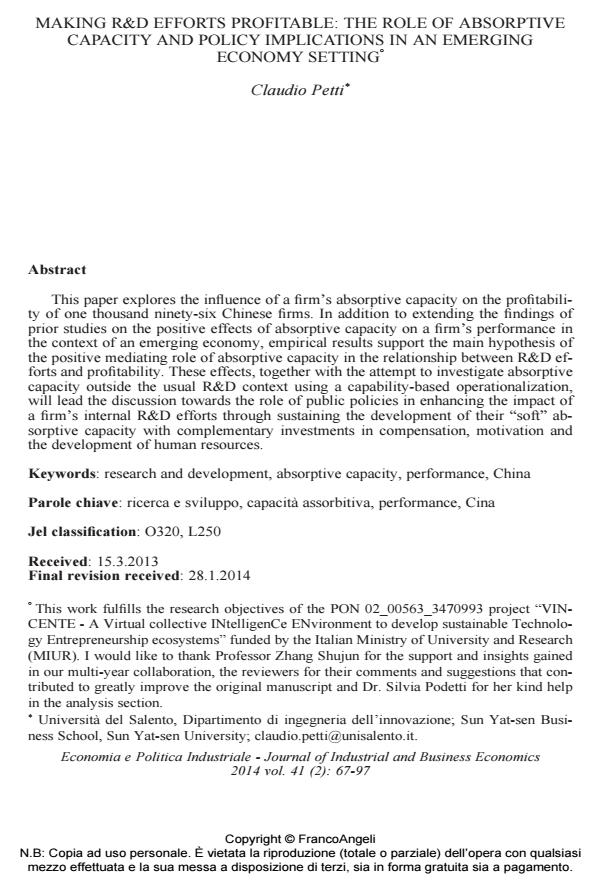Making R&D efforts profitable: the role of absorptive capacity and policy implications in an emerging economy setting
Titolo Rivista ECONOMIA E POLITICA INDUSTRIALE
Autori/Curatori Claudio Petti
Anno di pubblicazione 2014 Fascicolo 2014/2
Lingua Inglese Numero pagine 31 P. 67-97 Dimensione file 131 KB
DOI 10.3280/POLI2014-002004
Il DOI è il codice a barre della proprietà intellettuale: per saperne di più
clicca qui
Qui sotto puoi vedere in anteprima la prima pagina di questo articolo.
Se questo articolo ti interessa, lo puoi acquistare (e scaricare in formato pdf) seguendo le facili indicazioni per acquistare il download credit. Acquista Download Credits per scaricare questo Articolo in formato PDF

FrancoAngeli è membro della Publishers International Linking Association, Inc (PILA), associazione indipendente e non profit per facilitare (attraverso i servizi tecnologici implementati da CrossRef.org) l’accesso degli studiosi ai contenuti digitali nelle pubblicazioni professionali e scientifiche.
This paper explores the influence of a firm’s absorptive capacity on the profitability of one thousand ninety-six Chinese firms. In addition to extending the findings of prior studies on the positive effects of absorptive capacity on a firm’s performance in the context of an emerging economy, empirical results support the main hypothesis of the positive mediating role of absorptive capacity in the relationship between R&D efforts and profitability. These effects, together with the attempt to investigate absorptive capacity outside the usual R&D context using a capability-based operationalization, will lead the discussion towards the role of public policies in enhancing the impact of a firm’s internal R&D efforts through sustaining the development of their "soft" absorptive capacity with complementary investments in compensation, motivation and the development of human resources.
Parole chiave:Ricerca e sviluppo, capacità assorbitiva, performance, Cina
Jel codes:O320, L250
- Green supply chain collaborative innovation, absorptive capacity and innovation performance: Evidence from China Jiangtao Hong, Ruyin Zheng, Hepu Deng, Yinglei Zhou, in Journal of Cleaner Production 118377/2019 pp.118377
DOI: 10.1016/j.jclepro.2019.118377 - Government Support and R&D Investment Effectiveness in Chinese SMEs: A Complex Relationship Claudio Petti, Lauretta Rubini, Silvia Podetti, in Asian Economic Papers /2017 pp.201
DOI: 10.1162/ASEP_a_00504
Claudio Petti, Making R&D efforts profitable: the role of absorptive capacity and policy implications in an emerging economy setting in "ECONOMIA E POLITICA INDUSTRIALE " 2/2014, pp 67-97, DOI: 10.3280/POLI2014-002004